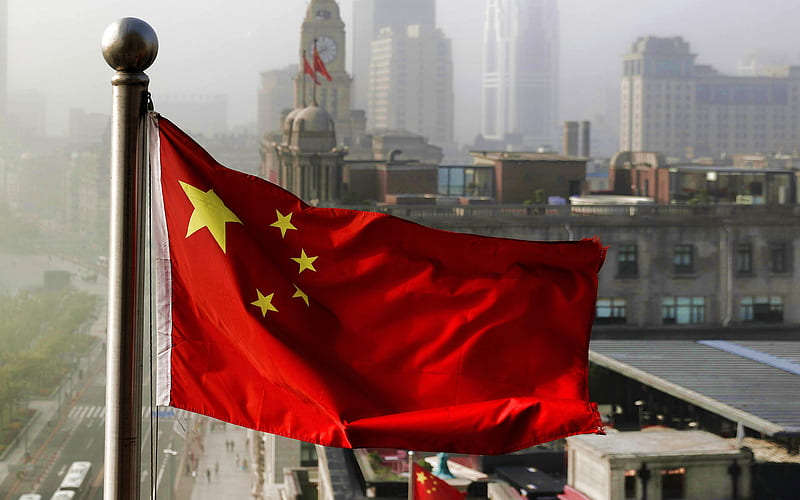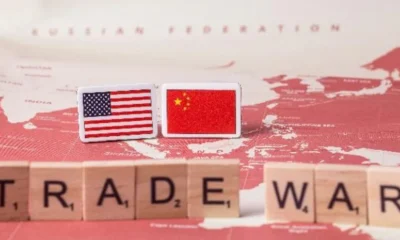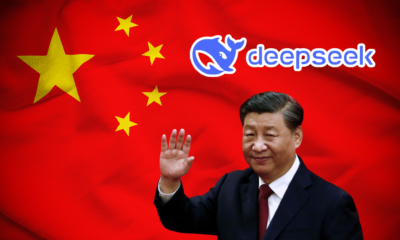Politics
Australia And Nauru Ink $100 Million Security Deal To Counter China’s Pacific Influence. How Does This Deal Impact China?
Published
1 year agoon

In a strategic move to curtail China’s growing presence in the Pacific, Australia has signed a $100 million security agreement with the Pacific island nation of Nauru. This significant pact is part of Australia’s broader strategy to solidify its influence in a region increasingly contested by China and Western powers.
Under the terms of the agreement, Australia will provide aid, banking, and infrastructure support to Nauru. In exchange, Canberra has secured a veto over Nauru’s potential agreements with third nations, particularly in critical sectors such as telecommunications, banking, and cybersecurity, for a five-year period. This effectively prevents any third party—widely interpreted as China—from leveraging Nauru’s critical infrastructure for strategic purposes.
The deal sends a direct message to Beijing. It mandates that Nauru must consult Australia before entering partnerships that could impact its security framework, thus countering China’s growing strategy of using economic investments to gain geopolitical leverage.
Australia’s Expanding Pacific Strategy
This is not the first time Australia has taken such measures. Earlier, it signed a similar agreement with Tuvalu, giving Canberra influence over security, banking, and telecommunications activities in the region. These deals are part of Australia’s response to China’s 2022 security agreement with the Solomon Islands, which had already raised alarms in Canberra. China’s recent test-firing of an intercontinental ballistic missile into the Pacific has only heightened these concerns.
According to Meg Keen, a Senior Fellow in the Pacific Islands Program at the Lowy Institute, “This deal effectively locks out China from engagement in the security sector, particularly policing and military.” The pact with Nauru, she noted, is a clear attempt to contain Beijing’s ambitions in the region.

The China-Nauru Connection
The timing of the agreement is particularly noteworthy, coming just months after Nauru suspended diplomatic ties with Taiwan, a move widely seen as aligning with China’s interests. Nauru’s President, David Adeang, even made a state visit to China—the first by a Nauruan leader—where he met with officials from the Bank of China amid reports of a potential financial services agreement.
Following the Australia-Nauru security deal, the Commonwealth Bank of Australia will now provide banking services in Nauru, marking a significant step in strengthening bilateral ties.
Australia is positioning this agreement as a template for other Pacific Island nations, emphasizing that Australia offers a more stable and beneficial partnership than China. Over recent years, Canberra has actively engaged in multilateral efforts, such as the Quad, to counter Beijing’s growing influence in the region.
Australia’s concerns were heightened by the presence of a Chinese space-tracking vessel sailing northwest of Nauru during the missile test launch. To address such security risks, the treaty includes a provision requiring Nauru to consult Australia before granting Chinese navy vessels access to its main port, which was recently upgraded by a Chinese state-owned company.
In a parallel development, Australia’s Defence Minister Richard Marles announced the successful test-firing of a Tomahawk cruise missile off the U.S. west coast. The missile, with an extended range of 2,500 kilometers (1,550 miles), indicates Australia’s commitment to strengthen its long-range strike capabilities as part of its broader defense strategy.
Australian Prime Minister Anthony Albanese and Nauru President David Adeang, speaking at a joint press conference after signing the agreement, highlighted the mutual benefits of the partnership. “This deal will strengthen Nauru’s longer-term stability and economic resilience. It is also firmly in Australia’s interests in a peaceful, secure, and economically resilient Pacific region,” Albanese stated.
President Adeang echoed this sentiment, expressing gratitude for Australia’s support. “We appreciate Australia’s steadfast support as we try to address our unique development challenges while we continue diversifying our economy, exploring innovative opportunities, and safeguarding our region’s peace and stability,” he said.
Albanese further affirmed that Australia would remain Nauru’s primary security partner, pledging additional investments to bolster policing and national security.
Nauru, the third-smallest country in the world by area, uses the Australian dollar and recently made a significant shift in its diplomacy by switching recognition from Taiwan to China earlier this year. This move reflects the delicate balancing act Pacific Island nations face amid the intensifying geopolitical competition between China and the West.

What Would This Deal Mean For China?
The Australia-Nauru security deal represents a significant setback for China’s ambitions in the Pacific, a region where it has been actively seeking to expand its influence through infrastructure investments, financial aid, and diplomatic engagement.
Here’s what the deal could mean for China-
1. Curtailing Access to Critical Infrastructure
The agreement explicitly restricts third-party nations, including China, from leveraging Nauru’s critical infrastructure for security purposes. This includes sectors like telecommunications, banking, and cybersecurity—key areas where China has been making inroads globally. By requiring Nauru to seek Australia’s approval before allowing Chinese navy vessels to use its main port, the deal limits Beijing’s ability to project military or strategic power in the region.
2. A Growing Counterweight to China in the Pacific
Australia is positioning itself as a reliable partner for Pacific Island nations, offering stability and security assurances. By securing veto power over Nauru’s agreements with third nations, Australia is directly countering China’s approach of using economic partnerships to gain geopolitical leverage. This deal, along with Australia’s similar agreement with Tuvalu, establishes a growing network of influence designed to contain China’s reach.
3. A Diplomatic Blow in the Pacific Islands
China has been building diplomatic ties in the Pacific, evidenced by its landmark security deal with the Solomon Islands and growing relationships with nations like Nauru following its diplomatic switch from Taiwan. This agreement, however, signals that not all Pacific nations are willing to align with Beijing. By aligning more closely with Australia, Nauru sets a precedent for other island nations, potentially limiting China’s ability to form deeper ties in the region.
4. An Erosion of Influence Post-Taiwan Switch
After Nauru’s recent decision to switch diplomatic recognition from Taiwan to China, Beijing might have anticipated stronger ties with the island nation. This deal undermines that expectation, demonstrating that China’s diplomatic victories in the Pacific can be counterbalanced by other powers like Australia.
5. Geostrategic Frustration
The Pacific is critical to China’s broader geostrategic goals, including its ambitions to establish stronger military and economic footholds globally. The veto clauses in the Australia-Nauru deal limit China’s ability to pursue these goals unchecked, particularly in a region already sensitive to its activities, such as missile testing and naval deployments.
A High-Stakes Geopolitical Chessboard
Australia’s security pact with Nauru illustrates the intensifying competition for influence in the Pacific. For Australia, these agreements are as much about safeguarding regional stability as they are about countering China’s assertive economic diplomacy. By solidifying ties with Pacific Island nations, Australia is reinforcing its position as a key player in the region, effectively creating a bulwark against Beijing’s ambitions.
As the Pacific becomes an increasingly pivotal arena for global power struggles, the Australia-Nauru pact marks another significant chapter in the region’s evolving geopolitical dynamics.
For China, the Australia-Nauru deal represents both a practical and symbolic roadblock in its Pacific strategy. It shows the growing resolve of Western-aligned nations to counter Beijing’s influence and sends a clear message to Pacific Island nations about the benefits of aligning with Australia over China. While it doesn’t eliminate China’s influence in the region, it complicates its efforts and strengthens the geopolitical rivalry in one of the world’s most contested regions.

You may like
-


Taiwan’s ‘Historic’ TSMC Deal, A Win Or The End Of Its ‘Silicon Shield’ As China Threatens? A Jittery Taiwan Watches Trump’s Moves On Ukraine, Wondering, Could We Be Next?
-


A Trade War That Just Won’t Quit. As Trump’s Tariffs Hit, China Stays The Course, For Xi’s Its Business As Usual Strategy
-


Indian Stock Market In Turmoil. Investors In Panic Mode, Is This A Temporary Correction Or The Start Of A Bear Market?
-


America And China’s Thirst For Gold In 2025 Is Draining Other Countries’ Reserves; Here’s Why?
-


Shakeup In The Auto Sector. Mercedes-Benz 15% Job Cuts, Nissan CEO Exit, And Germany’s Make-Or-Break Year
-


DeepSeek Ai Rush. China’s AI Contender Gears Up for Next Big Launch Even As It Gets Xi Jinping’s Blessings